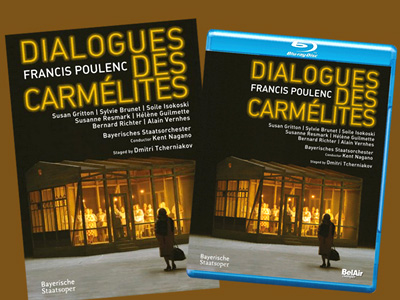
By ANDREW POWELL
Published: August 18, 2017
MUNICH — BelAir Classiques and Mezzo TV have succeeded in getting a ban overturned on their sale and airing, respectively, of a 2010 filmed staging of Dialogues des Carmélites made here at Bavarian State Opera.
The ban, or arrêt, had been imposed in 2015 by the Cour d’appel in Paris following a complaint by heirs of Francis Poulenc and the opera’s source novelist Georges Bernanos.
In that court’s judgment, “the staging by Dmitri Tcherniakov realizes in its final scene a dénaturation of the [opera] and thus infringes the moral rights of authors attached to it.” Dénaturation translates as adulteration or falsification.
Indeed the Russian director substitutes in the climactic scene a deadly gas blast and one self-sacrifice for the serial guillotining of the titular nuns laid out graphically in Poulenc’s music.
But France’s higher Cour de cassation saw the case differently in its June 27 ruling, according to BelAir and Mezzo attorney Judith Adam-Caumeil of Cabinet Adam-Caumeil, a law firm specialized in Franco-German business.
It overturned the ban, she said, because no alteration had been made to libretto or score and the Cour d’appel had admitted that the opera’s essential themes, such as hope, martyrdom, grace, and the communion of saints, dear to Bernanos and Poulenc, had been respected.
Declaring the case a “landmark” with regard to “artistic freedom of staging in French law,” she suggested the ruling would apply equally to “theater, ballet or cinema.”
Not at issue was copyright, even with Dialogues remaining rights-protected in Europe and America, although this status kept BStO and its director from tampering with the words and music.
Adam-Caumeil: “Tcherniakov certainly brought his own vision to the original work by altering the final scene, but the music and text remained unchanged. The essential themes … were respected because the nuns were ready to die … . Thus, no dénaturation of the primary work can be blamed on Tcherniakov.”
BStO joined in appealing the ban. Dialogues most recently appeared on the company’s National Theater stage early last year, in defiance of a letter from the heirs (but not of the ban), and will in 2020 return, said BelAir distributor Naxos in an Aug. 4 statement.
BelAir and Mezzo can now profit from the content as before, and Naxos early this month relaunched BelAir’s DVD along with a new Blu-ray edition.
Illustration © BelAir Classiques
Related posts:
Poulenc Heirs v. Staatsoper
Ettinger Drives Aida
Mélisande as Hotel Clerk
Return of the Troubadour
Kušej Saps Verdi’s Forza

Guillaume Tells
Wednesday, September 23rd, 2015By ANDREW POWELL
Published: September 23, 2015
MUNICH — Post is under revision.
Still image from video © Bayerische Staatsoper
Related posts:
Nitrates In the Canapés
Muti the Publisher
Honeck Honors Strauss
Kušej Saps Verdi’s Forza
Time for Schwetzingen
Tags:Amanda Forsythe, Andrew Foster-Williams, Antonino Fogliani, Antonio Pappano, Antú Romero Nunes, Bad Wildbad, Bavarian State Opera, Bayerische Staatsoper, Bongiovanni, Bryan Hymel, Camerata Bach Chor Poznań, CD, Commentary, Coro del Teatro Comunale di Bologna, Damiano Michieletto, Dan Ettinger, Decca, DVD, Evgeniya Sotnikova, Gerald Finley, Graham Vick, Guillaume Tell, Günther Groissböck, Jochen Schönleber, John Osborn, Juan Diego Flórez, Judith Howarth, Kritik, Luca Tittoto, Malin Byström, Marina Rebeka, Michael Spyres, Michael Volle, Michele Mariotti, München, Münchner Opernfestspiele, Munich, Munich Opera Festival, National Theater, Nationaltheater, Naxos, Nicola Alaimo, Nicolas Courjal, Opus Arte, Orchestra del Teatro Comunale di Bologna, Pesaro, Raffaele Facciolà, Review, Rossini, Rossini Opera Festival, Royal Opera House, Sofia Fomina, Tara Stafford, Virtuosi Brunenses
Posted in Munich Times | Comments Closed